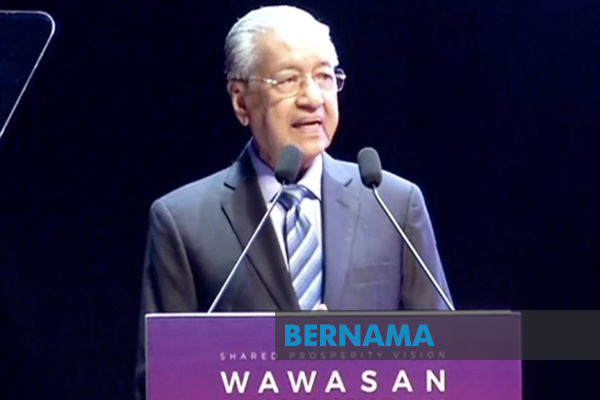WKB2030 can make Malaysia a new Asian Tiger: Dr Mahathir

Dr Mahathir launching the WKB2030 (Bernama)
Kuala Lumpur: In restructuring priorities of the progress of the nation, the Shared Prosperity Vision 2030 (WKB2030) can put Malaysia as a new a Asian Tiger and provide a decent standard of living for all Malaysians by 2030, said Dr Mahathir Mohamad.
The Prime Minister said it will give higher value to the country’s economy and make Malaysia a nation that is competitive, of high integrity and with dignity.
“This will make Malaysia regain the trust of the market and investors and be able to place Malaysia as a new Asian Tiger,” he was quoted as saying by BERNAMA news agency when launching WKB2030 here today.
Dr Mahathir who described WKB2030 as a vision and a gift for the current generation and generations to come, said it will bring about more equitable growth.
He said the blueprint for the nation’s direction from 2021 till 2030 is an effort to make Malaysia a country that continues to grow sustainably with wealth distribution that is fair and inclusive encompassing each income group, across ethnic groups and regions.
It is also includes the supply chain so as to create social harmony and political stability, he said.
The prime minister said the vision’s objective to provide a decent standard of living for all Malaysians by 2030 is also in line with the United Nations Agenda 2030 (Sustainable Development Goals).
“It entails an inclusive development approach based on the principle no one should be left behind,” he said.
“There are three objectives we wish to achieve through WKB2030, that is development for all; address wealth and income disparities; and a united, prosperous and dignified nation,”said Dr Mahathir.
He said Malaysia wanted continued prosperity by creating economic growth that was sustainable and competitive and able to absorb any negative changes in terms of supply and demand as well as global economic uncertainty.
Among the main guiding principles were to ensure equitability of outcomes via an economic strategy which assures that an outcome of an initiative can be enjoyed by groups and individuals equitably, he said.
This, he said, took into consideration hurdles faced by the groups and individuals which might be because of differences in economic background and the environment.
“Weaker groups and the less capable will assisted and given certain privileges so that they can compete fairly with those more fortunate for more equitable outcomes,” he said.
BERNAMA





















































